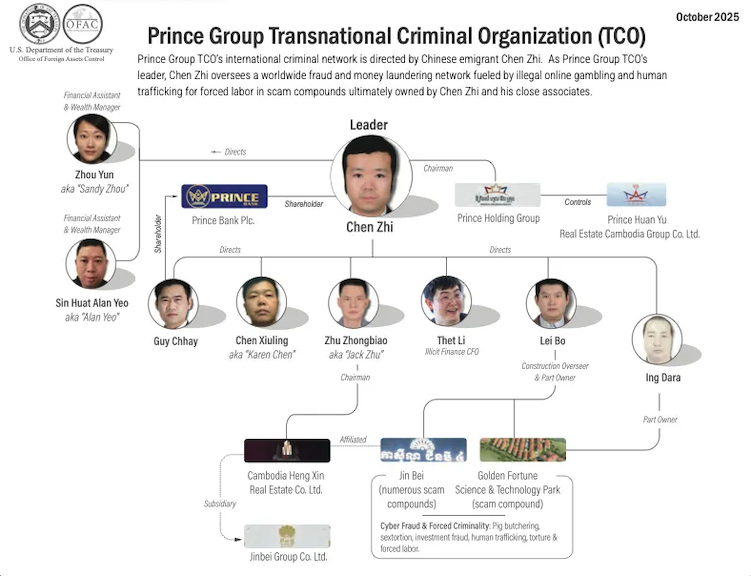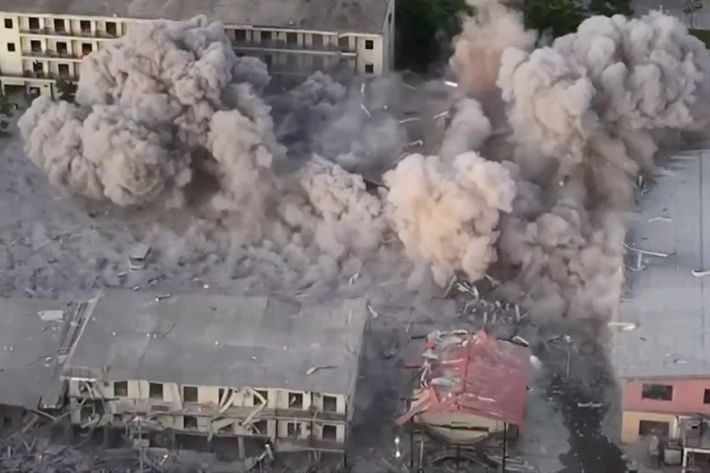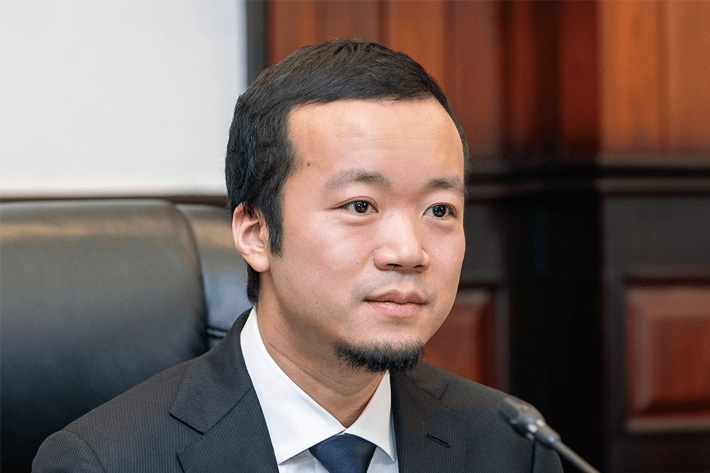The move by the US Treasury and UK officials to sanction the Prince Group and declare it a transnational criminal organisation has spurred a flurry of asset seizures in countries across Asia and other parts of the world.
The joint announcement in mid-October has been lauded by investigators probing the frightening proliferation of scam centres in Southeast Asia. But it has also led to questions on why it took financial authorities in the US, Britain, Singapore, Taiwan and Thailand so long to expose a group now described as one of the largest criminal entities in Asia. Radio Free Asia first flagged suspicions of criminal activities by the group in February 2024.
Prince Group chairman Chen Zhi, 37, a Chinese citizen who moved from Fujian province to Phnom Penh about 15 years ago, is alleged to have built a conglomerate worth $60 billion over the past decade based on online fraud, such as romance scams, undertaken by slaves tricked into working in abusive scam compounds in Cambodia. An indictment filed in the US alleges that Chen bragged once that his ‘pig butchering’ scams were pulling in $30 million a day.
ALSO SEE: China is ‘World’s Largest Creditor, Lends Most to US, Rich Nations’
The huge scale of businesses that Prince Group was allegedly involved in – ranging from two companies listed on the Hong Kong stock exchange to a family office in Singapore, an office block and a swag of luxury properties in cities such as London, Taipei and Tokyo, plus shopping malls, a bank, casinos, hotels, restaurants, private jets and boats in places as far flung as Palau and Vanuatu in the Pacific – has raised questions on whether Chen had support from Chinese agencies or officials.
News reports in Taiwan have alleged that the island’s National Security Bureau said Prince Group was connected to Chinese “United Front” activities in Cambodia and that it helped provide over half of a $260 million grant to Cambodia in 2018. Taiwanese investigators have reportedly discovered links to major triad gangs and found that key Prince Group executives controlled or had dealings with 23 companies.
On October 14, the US Office of Foreign Assets Control (OFAC) imposed sanctions on 146 entities and individuals. That figure alone gives an indication of the staggering amount of money the Prince Group made.

Assets seized in multiple Asian cities
In the five weeks since, authorities in Hong Kong, Singapore, South Korea, Taiwan and Thailand have taken action to assess and freeze assets suspected to belong to Chen Zhi or the Prince Group. They total nearly $700 million.
In Hong Kong, officials froze assets worth $353.5 million, while police in Singapore seized cash and assets worth $115 million.
In South Korea, authorities have frozen funds in five banks amounting to 90 billion won (about $62 million).
And in Taiwan, a task force was set up on October 15 to trace Prince Group assets and financial flows. That led to police raiding 47 premises allegedly connected to senior members of the group and related firms based in Taipei. Some 25 suspects were detained, according to the Taipei District Prosecutors’ Office.
The Taipei Times said “prosecutors obtained court approval to seize 18 real-estate properties — including 11 luxury apartments and 48 parking spaces in the upscale Peace Palace complex on Taipei’s Heping East Road — worth NT$3.81 billion ($122 million) to prevent asset flight.
“In addition, 26 luxury vehicles, including Rolls-Royce, Ferrari and Lamborghini models valued at NT$477.58 million, and 60 bank accounts holding NT$235.87 million, were also confiscated.”
In Japan, Chen Zhi was also found to own a luxury condo in Tokyo, according to a report by Kyodo. It said Chen initially registered his residence at a location near the Prince Holding Group headquarters in Phnom Penh, but in 2024, he changed the address to a luxury condominium in Tokyo’s Minato ward, after setting up a Prince Group office in Chiyoda ward.
Two days after the US sanctions were imposed, Japan beefed up its requirements for foreigners entering the country on business manager visas, including increasing the minimum capital investment from 5 million yen to 30 million. Chen’s company was reported to have capital of 5 million yen.
Chen Zhi, the discreet cyberscam boss embraced and honoured by Cambodia’s longtime leader Hun Sen, was said to have visited Japan frequently. However, “none of the residents of the Tokyo condominium contacted by Kyodo News recalled ever seeing him.”
How did the group grow so big and get away with its crimes for long?
Asian crime analyst Martin Purbrick said on Monday: “The answer is likely to be related to corruption amongst government officials (certainly in Cambodia, Taiwan and Thailand), as well as systemic failures of anti-money laundering enforcement systems in Asia.”
He said the US Department of Justice indictment alleges that Chen and his co-conspirators “used their political influence to protect the scam operations from law enforcement in multiple countries, including from the Chinese Ministry of Public Security (MPS) and Ministry of State Security (MSS)”, and also that “Prince Group executives bribed public officials for information in advance of law enforcement raids of Prince Group scam compounds.”

KK Park destroyed in ‘show’ crackdown
In Thailand, police have also been reviewing assets related to Prince Group, although the new Anutin Charnvirakul government has had its hands full dealing with the simmering crisis on the Cambodian border, and scam centres way across on its northwestern border with Myanmar.
The Immigration Bureau has ramped up efforts to stop foreigners entering the country being recruited to work in scam call centres in neighbouring countries. That follows a flood of foreigners fleeing Myanmar after a staged demolition of the Myawaddy scam-hub known as KK Park.
This was one of several dramatized responses to the West’s strike on Prince Group – in Myanmar, Cambodia and China, which most analysts felt were political stunts for foreign audiences, partly because President Trump is threatening tariffs on Southeast Asian countries, while Chinese President Xi Jinping is known to detest scam centres, particularly those run by Chinese criminals who target their homeland.
Myanmar’s military leader Min Aung Hlaing has plenty of reasons for displaying loyalty to Xi, as China is his second largest supplier of arms after Russia, providing about 3,000 drones, plus fighter jets that have tormented ‘rebel’ villages throughout the north and helped re-balance the civil war that has raged since February 2021.
He has also been under pressure from the US, South Korean and Thai governments to rein in groups involved in money laundering, illegal gambling and human trafficking. And, he will stage an election soon to try to legitimise his despised military takeover.
On the evening of October 24, the Myanmar military began bombing buildings in KK Park, a notorious scam centre across the Moei river from Mae Sot, Thailand’s main border hub. In following days, heavy machinery was also brought in. By early November, 101 buildings in the cybercrime base were reportedly demolished, with another four dozen earmarked for a similar fate.
In the last week of October, the military’s action caused over 1,500 ‘scammers’ of various nationalities to flee over the river back into Thailand. Most were Indian nationals (465), followed by Africans (270), Filipinos (220) and Chinese (187).
More than 240 of the Indian ‘suspects’ were flown home in an Indian military plane last week. All were said to have been interviewed by Thai immigration officials, who took their biometric data to prevent them from re-entering Thailand under false identities, Khao Sod News said.
At best, the destruction of KK Park could be called a good start. That’s because two other cybercrime hubs are located nearby on the border – Shwe Kokko and Tai Chang, which Thai PBS said “remain intact and flourishing“. Shwe Kokko is protected by a Border Guard Force led by Chit Thu, an infamous Karen warlord, while Tai Chang is guarded by a Democratic Karen Buddhist Army (DKBA) militia.
Mafia clan leaders sentenced to death
China also got into the act, with a court in Shenzhen sentencing five top members of an infamous Myanmar mafia to death in early November.
Some 21 members and associates of the Bai family, which rose to power in the 2000s and transformed Laukkaing, a poor town in northern Myanmar, into a notorious casino and red-light hub, were convicted of fraud, homicide, injury and other crimes, a state media report published on the Shenzhen Intermediate People’s Court website.
They were said to have got into scamming in recent years and trafficking thousands of Chinese and other workers, who were forced to defraud others in criminal activities worth 29 billion Chinese yuan ($4.1 billion), a BBC report said.
Officials said the Bais, who had their own militia, set up 41 compounds to house casinos and cyberscam operations. They were accused of causing the death of six Chinese citizens, plus a suicide and multiple injuries. These penalties are part of China’s campaign to eradicate scam networks in Southeast Asia – and send a warning to other criminal syndicates.
In September, another Chinese court sentenced 11 members of the Ming family – another clan from Laukkaing – to death.
Thai citizens tortured to death
While the civil war has brought chaos to many parts of Myanmar, the scamming in Cambodia stems more from Chinese crime gangs, such as Prince Group, and their ability to team up with the country’s most powerful political figures.
Thais have been reminded recently just how sordid and violent these operations are. Just this week, Thai news groups have reported two citizens – a young woman named Suda Chonlaket and a man identified only as Sarawut – both of whom were allegedly tortured to death in a call centre compound in Poipet, a town on Thailand’s eastern border.
Suda, 26, had been tortured for failing to generate 100,000 baht ($3,083) in daily earnings, according to a report by the Bangkok Post. It said she was punished – forced to do 1,000 to 2,000 squats until she lost consciousness. Then, her overseers used electric shocks to try to get her to regain consciousness, but allegedly killed her in the process.
The previous week, another two alleged deaths were recorded. Thai news agencies have taken far greater interest in these incidents since a border clash erupted in July. It is not known yet if that building is linked to the Prince Group.
But Chinese cyber gangs have also been accused of killing with impunity in scam centres on Thailand’s northwestern border with Myanmar.
Meanwhile, Prince Group has said it “categorically rejects the notion that it or its chairman, Chen Zhi, has engaged in any unlawful activity. The recent allegations are baseless and appear aimed at justifying the unlawful seizure of assets worth billions of dollars.”
- Jim Pollard
NOTE: Further details and a diagram were added to this report and the headline amended on Nov 19-20; the KK Park image was changed on Nov 25, 2025.
ALSO SEE:
US, UK Lauded for Scam Centre Sanctions, $15bn Bitcoin Seizure
US Targets Billion-Dollar Scam Networks in Myanmar, Cambodia
Cambodian Scam Centres Straining Ties With States Near And Far
US Sanctions Karen Warlord, Cambodia ‘Money Laundering Group’
Cyber Scam Hubs Spread From Asia Like a Global Cancer: UN
Thousands in Limbo as Thailand Fights Scam Hubs on Two Fronts
SE Asia Crime Networks Rely on Telegram, Crypto, UN Says
Weak ASEAN Nations ‘at Risk of Evolving Into Scamming States’
‘US to Sanction Prominent Cambodians Tied to Scam Centres’
N Korean Hackers Used Cambodian Firm to Launder Stolen Crypto
Cambo-Chinese Firm Tied to Crypto Scams, Money Laundering
Scamming Compounds in SE Asia Stole $64 Billion in 2023: Report
























